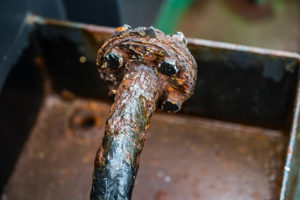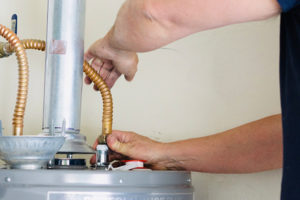In the world of commercial property management, plumbing issues are more than just a minor inconvenience; they can be major disruptions. Whether it’s a retail space, an office building, or a restaurant, plumbing problems can impact customer experience, employee productivity, and even the structural integrity of the property. It’s crucial for business owners and facility managers to understand these common issues and know how to address them swiftly and effectively. This article delves into five prevalent commercial plumbing problems and provides practical solutions to keep your business running smoothly.
Clogged Drains and Toilets
- The Issue: Clogged drains and toilets are perhaps the most common plumbing issues in commercial settings. The heavy usage of facilities, especially in businesses like restaurants or malls, can lead to frequent blockages. This not only causes inconvenience but can also lead to unpleasant odors and sanitary concerns.
- Prevention Tips:
- Regular Cleaning: Ensure drains and toilets are cleaned regularly to prevent buildup.
- Proper Usage Guidelines: Post guidelines in restrooms and kitchens about what can and cannot be flushed or disposed of down the drain.
- Solutions:
- Manual Unclogging: For minor clogs, a plunger can often do the trick. Ensure your maintenance team knows the proper technique.
- Professional Drain Cleaning: For persistent or severe clogs, it’s wise to call in professional plumbers. They have the right tools and expertise to clear the blockage without damaging the plumbing.
Leaking Faucets and Fixtures
- The Issue: Leaks in faucets and fixtures are not only annoying but also wasteful and costly. In a commercial setting, where faucets see frequent use, leaks are common and can significantly increase water bills.
- Prevention Tips:
- Routine Checks: Regularly check for signs of leaks or drips in all fixtures.
- Washer Replacements: Replace washers periodically to ensure a tight seal on faucets.
- Solutions:
- DIY Fixes: Simple leaks often just require tightening of the fixture or replacing a washer, which can be done in-house.
- Professional Repairs: For more complex leaks, especially those involving the internal plumbing or if the leak’s source is unclear, professional help is advisable.
Pipe Corrosion and Leaks

- The Issue: Over time, pipes, especially those made of metal, can corrode and weaken, leading to leaks. This is a significant concern in older buildings where the plumbing may not have been updated for decades.
- Prevention Tips:
- Regular Inspections: Have a professional plumber inspect your pipes periodically for signs of corrosion or damage.
- Water Treatment: In areas with hard water, consider water treatment solutions to reduce pipe corrosion.
- Solutions:
- Pipe Repair or Replacement: Depending on the extent of the damage, corroded pipes may need to be repaired or completely replaced. This is typically a job for experienced professionals, as it involves significant work and expertise.
Sewer System Backups
- The Issue: A sewer system backup is more than just a plumbing problem; it’s a serious health hazard. Common causes in commercial buildings include blocked sewer lines, damaged pipes, or excessive rainwater infiltration. Signs of a sewer backup include multiple clogged drains, bad odors, or water backing up from toilets or floor drains.
- Prevention Tips:
- Avoid Flushing Inappropriate Materials: Educate staff and customers about what shouldn’t be flushed down toilets or poured down drains.
- Regular Sewer Line Inspections: Have a professional regularly inspect and clean the sewer lines to prevent blockages.
- Solutions:
- Professional Sewer Line Cleaning: At the first sign of trouble, enlist a professional plumbing service to clean the sewer line. They have specialized equipment like high-pressure water jetters to effectively clear blockages.
- Repair or Replacement: In cases of broken or severely damaged sewer lines, repair or replacement may be necessary. This work should always be conducted by licensed professionals, as it often involves excavation and specialized knowledge.
Malfunctioning Water Heaters

- The Issue: Water heaters are essential in many commercial settings for both comfort and various business operations. Problems can range from inadequate hot water supply to leaks or complete breakdowns, all of which can significantly disrupt business activities.
- Prevention Tips:
- Regular Maintenance: Schedule regular maintenance checks to ensure the water heater is functioning optimally. This includes checking for leaks, sediment buildup, and proper operation of pressure relief valves.
- Correct Sizing and Installation: Ensure that your water heater is adequately sized for your needs and properly installed. An undersized unit will be overworked, leading to frequent breakdowns.
- Solutions:
- Thermostat Adjustments: If the water temperature is inconsistent, it might be a simple issue with the thermostat settings. This can often be fixed in-house.
- Professional Repair or Replacement: For more complex problems like leaks or mechanical failures, professional repair or replacement is necessary. A qualified plumber can diagnose the issue and recommend the best course of action.
Conclusion
Dealing with commercial plumbing problems can be challenging, but understanding these common issues and how to address them can save your business time and money. Regular maintenance and inspections are key to preventing many of these problems. When issues do arise, it’s often best to rely on professional plumbers who have the expertise to handle commercial plumbing systems effectively. By being proactive and informed, you can ensure that your business’s plumbing system remains reliable and efficient, minimizing disruptions and maintaining a safe, comfortable environment for your employees and customers.